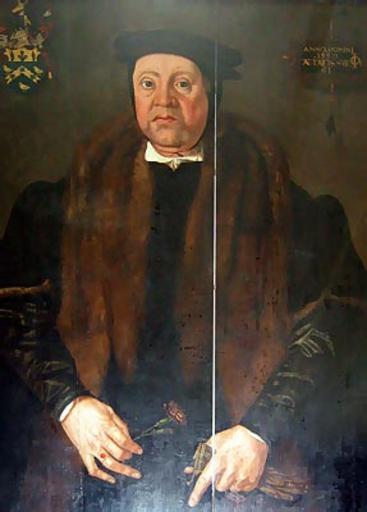MAKE A MEME
View Large Image

| View Original: | John_Winchcombe,_"Jack_O'Newbury".jpg (287x400) | |||
| Download: | Original | Medium | Small | Thumb |
| Courtesy of: | www.flickr.com | More Like This | ||
| Keywords: people Jack O'Newbury (died February 1519) was the much-used nickname of John Winchcombe, otherwise John Smallwood, one of the richest and most influential English cloth merchants of the late 15th and early 16th century. As the nickname suggests, he resided in Newbury in Berkshire. Jack was supposedly born, John Smallwood, at Winchcombe in Gloucestershire, after which he later took his formal surname. He was set to work at the abbey there, but ran away in order to seek his fortune. He became a cloth worker in Newbury where he apparently came to the attention of his master's wife. Upon this clothier's death, he was tricked into marrying the widowed lady and so quickly became the proprietor of one of the largest wool manufacturing establishments in the country. He is said to have set up the first factory in England, sent troops to the battle of Flodden and refused a knighthood from King Henry VIII. His story is told by Thomas Deloney in his Pleasant History of John Winchcombe and less fully in Thomas Fuller's History of the Worthies of England. Jack was a great patron of Newbury and the site of his house can still be seen off Northbrook Street. Contemporary panelling from this building can be seen in West Berkshire Museum. He began the rebuilding of St. Nicolas Church in 1500 and was buried there under an extant brass memorial upon his death in February 1519. His vast fortune was inherited by his eldest son, John Winchcombe II. Jack O'Newbury (died February 1519) was the much-used nickname of John Winchcombe, otherwise John Smallwood, one of the richest and most influential English cloth merchants of the late 15th and early 16th century. As the nickname suggests, he resided in Newbury in Berkshire. Jack was supposedly born, John Smallwood, at Winchcombe in Gloucestershire, after which he later took his formal surname. He was set to work at the abbey there, but ran away in order to seek his fortune. He became a cloth worker in Newbury where he apparently came to the attention of his master's wife. Upon this clothier's death, he was tricked into marrying the widowed lady and so quickly became the proprietor of one of the largest wool manufacturing establishments in the country. He is said to have set up the first factory in England, sent troops to the battle of Flodden and refused a knighthood from King Henry VIII. His story is told by Thomas Deloney in his Pleasant History of John Winchcombe and less fully in Thomas Fuller's History of the Worthies of England. Jack was a great patron of Newbury and the site of his house can still be seen off Northbrook Street. Contemporary panelling from this building can be seen in West Berkshire Museum. He began the rebuilding of St. Nicolas Church in 1500 and was buried there under an extant brass memorial upon his death in February 1519. His vast fortune was inherited by his eldest son, John Winchcombe II. | ||||